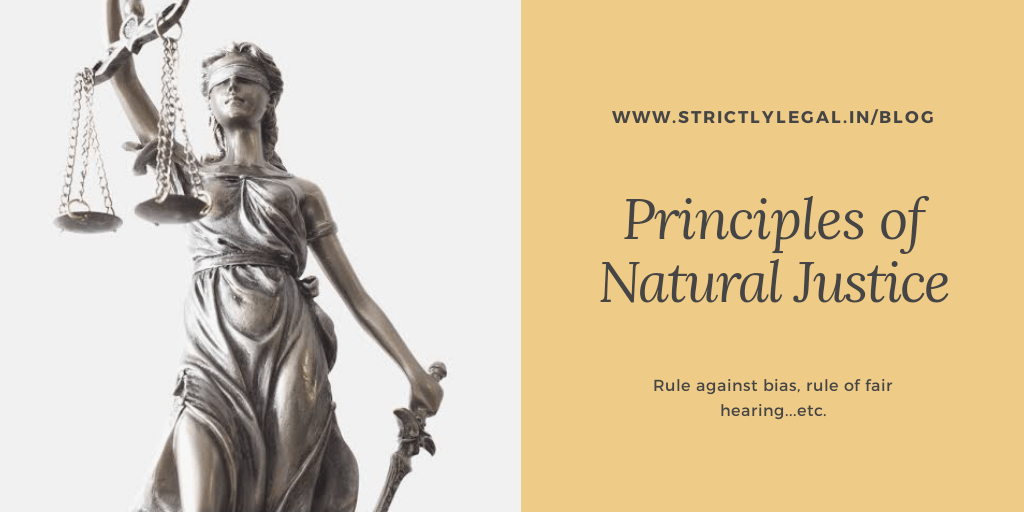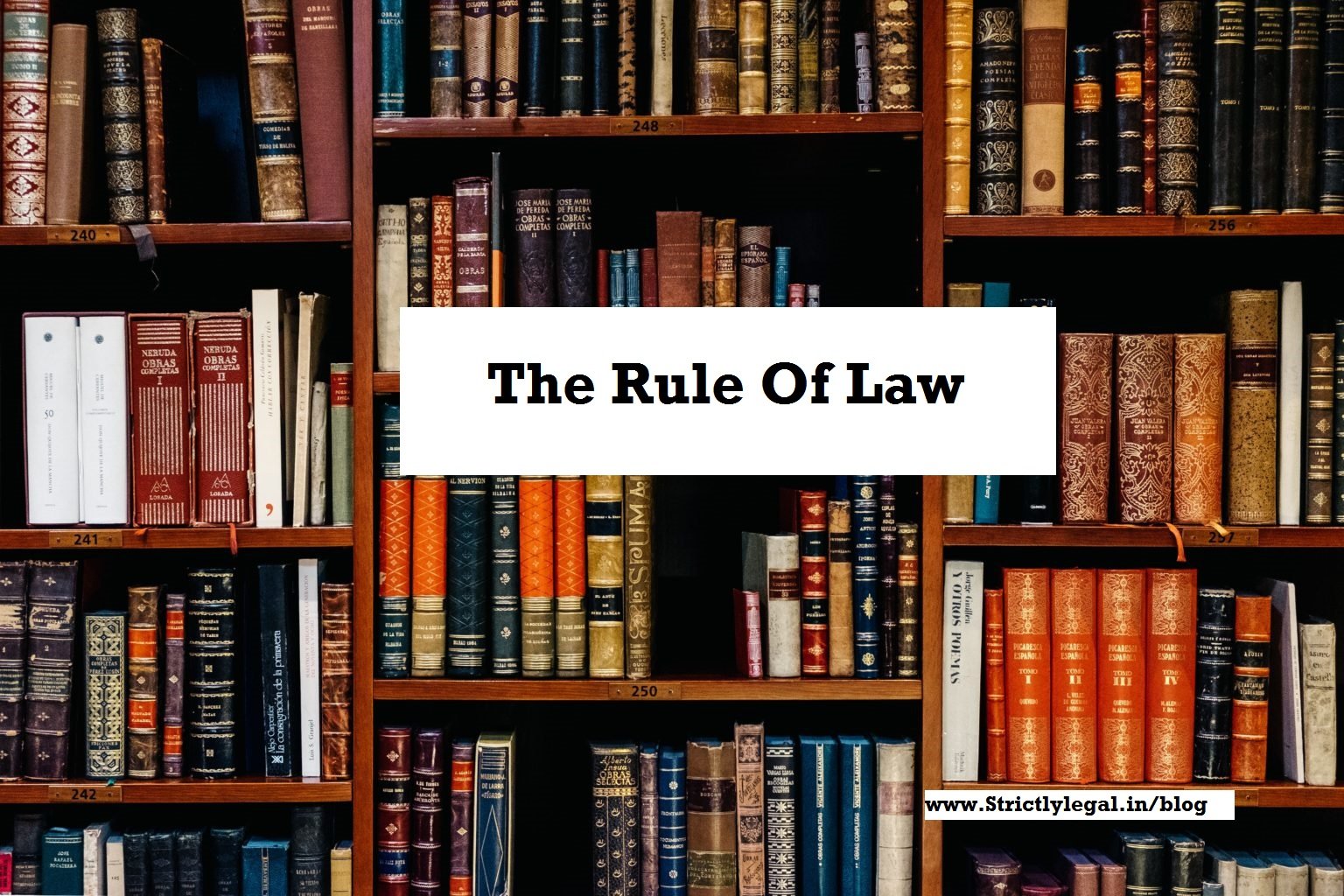The exact meaning of justice is debatable. But that does not mean we will not be able to define the principles of Natural Justice.
Table of Contents
What do the principles of Natural Justice mean?
Natural Justice could be defined as a systematic process of rendering justice by the judicial, quasi-judicial, and other administrative authorities.
The principles of Natural Justice are one of the fundamental elements that can uphold a free society. The sole purpose of this is to prevent a miscarriage of justice. A society that does not weigh on important principles such as these will render the administration of justice impossible and unpleasant.
Natural Justice requires fairness, reasonableness and equality when adjudicating matters.
The adherence to principles of natural justice as recognized by all civilized States is of supreme importance when a judicial, quasi-judicial or an administrative body embarks on determining disputes between the parties, or any administrative action involving private individuals.
Principles such as these are not expressly dictated on any statues in India and yet they are so finely embedded that they cannot be departed from.
Origin theory
The term ―Principles of Natural Justice is derived from the expression “Jus
Natural” of the Roman Law.
There are a lot of theories that state the origin of the Principles of Natural Justice, however, nothing any specific.
It is said that this principle exists from the time of Adam and Eve as found in the Holy Bible,
Even God did not pass a sentence upon Adam before he was
called upon to make his defence.“Adam” says God, “where art thou? Hast thou not eaten of the tree whereof I commanded thee that thou shouldest not eat”.
Cooper v. Wandsworth Board of Works [(1863) 143 ER 414]
Some say that the first statutory provision relating to the Natural Justice was found in the Magna Carta from King John I’s time. Magna Carta is known to the first-ever document that defined an Individual’s rights.
Why do we need the Principle of Natural Justice?
For a simple reason: Judgments without following the Principles of Natural Justice are judgments without justice.
Rules of Natural Justice
There are two rules of natural justice
- Rule against bias.
- Rule of fair hearing.
However, as time demanded. a new rule was later added.
- Rule of Reasonableness
We shall discuss each of these principle in details below
Rule against Bias
Nemo debet essc judex in propria causa: This maxim when translated into English means no one should be the judge in his own case.
In other words, the authority sitting to judge a case should be free from bias i.e not be partial and should not have any interest in the case which can probably affect his judgement.
This principle is also known as the Doctrine of Bias.
To capsulate:
- No one should be a judge in his own case
- The case should be objectively decided.
- On the basis of evidence on record.
- The judge should not have any interest whatsoever.
A person can be biased in many ways, including subject matter bias, institutional bias, however, to broadly classify:
Pecuniary Bias
As the term pecuniary indicates, a person is said to be pecuniary biased when he has money or monetary interest in the case.
In Mohapatra vs. State of Orissa (AIR 1984 S.C. 1572), it was held that when the author of a book was a member of the panel set up for selection of books, and his book was also under nomination by that panel, the possibility of bias could not be ruled out and that the selection by that committee cannot be upheld.
It is to be noted that the probability of bias is sufficient to invalidate the right to sit in judgment and there is no need to have the proof of actual bias.
Personal Bias
Personal bias could arise due to personal relationships such as friendship, love, professional grievance, acquaintances, or even enmity. This list is endless just like human relationships.
It is difficult to prove the state of mind of the person sitting for the judgment, therefore, a reasonable ground must exist for believing that there may be a personal bias.
In Tata Motors Limited v. the state of West Bengal, on the constitutional validity of the Singur Land Rehabilitation and Development Act, Justice Saumitra Pal recused himself from the case, citing that he knew some of the people in relation with the case personally.
Official bias
These type of biases may arise in cases where an administrator who enunciates and then has to carry out official policy, is entrusted with the duty of hearing objections from the concerned persons as to the implementation of those policies.
In easier terms, Let me explain with an example:
Mr. Khan, a government employee is entrusted with the duty to manage the business of its firm in the state of West Bengal. Khan agrees and chalks out a plan and lays certain policies as to how it will function and recruits several individuals under him as employees of the firm.
While the operations are running, a person recruited under him objects to a certain policy that he has made. Khan will not be barred from making a rational judgment to solve the implications here just because he has an official bias.
Here the general rule is that the bias that may be said to be likely to arise because the adjudicator has a general interest in the subject matter and administration of the policy in his official capacity, would not operate as a disqualification
In Viraj vs. State of Orissa 1967 SC 158, the mere fact that the Registrar of Cooperative Societies has a power of general supervision over all Co-operative Societies, does not amount to inherent bias in him so as to disqualify him for the purpose of acting as an arbitrator or judge under Section 18 of the Rules made under the Co-operative Societies, Act 1912 to decide disputes between members of a Society.
Rule of fair hearing
Audi alteram partem: This maxim when translated to English means to hear the other party or the rule of a fair hearing or the rule that no one should be condemned unheard.
In other words, the person to whom the decision is likely to affect must have a reasonable opportunity of being heard.
If courts, tribunals or other administrative authorities decide cases on one sided petitions, it wouldn’t be a fair play. Under the principle of Natural Justuce every individual is entitled to be heard appropriately.
The rule of fair hearing is the Sine Qua Non of every civilized society and is not a free-hanging code rather it is a code of procedure that covers every stage through which an administrative adjudication passes.
This rule includes certain rights. However, the belowe list is not exhaustive in nature.
- The right to notice.
- The right to know the evidence against him:
- The right to present his case or right to representation.
- The reasonable time to file a reply.
- The Right to present evidence in support and etc.
Rule of Reasonableness
This means that an order or judgment must be supported with reasonable reasons to back it. In other words, an order or judgment must speak for itself.
Lord Denning says, “the giving of reasons is one of the fundamentals of good administration.”
An order or a judgment without sufficient reason could be a breach of Natural Justice.
Ces-sante Ratione Legis Cessat Ipsa Lex: The English version of the said principle given by the Chief Justice Y.V. Chandrachud is, “Reason is the soul of the law, and when the reason of any particular law
ceases, so does the Law itself”
Exceptions to the Principles of Natural Justice
- Emergency: The principle of natural justice might not be possible in unnatural circumstances such as in case of a break-down of constitutional machinery or during the time Emergency prevails.
- Confidentiality: Any circumstances that may affect the confidentiality of a thing by applying the principles of natural justice.
- Routine matters: Refers to the minute small things in which applying the rule of natural justice will not be worth it.
- Impracticability: Not applicable in practical situations.
- Interim preventive action: Any judgment or order that is taken as an interim or temporary measure may not be in the interest of natural justice.
- Legislative action: Legislative action refers to actions taken by the legislature in the administration of the government.
- No right of the person is infringed: The principles can only be applied where there is a breach of individual’s right.
Principles of Natural Justice with reference to India
In the case State Of U.P vs Vijay Kumar Tripathi, it was said that the principles of natural justice is to be read with the provisions of the law.
In many instances the law would provide for the procedure to be followed and such a procedure could be more strict than the rule of natural justice, it such a situation the procedure laid must be followed.
However, when the law does not state a procedure or states a procedure that is less strict than the rule of natural justice, the rule must be followed. Exceptions do exist though.
In the case H.L. Trehan And Ors. Etc vs Union Of India And Ors, it was decided that even when the authority has a substantive power to take action without hearing , it cannot do so as it would be a violation of article 14 and the principle os natural justice,
It is now a well established principle of law that there can he no deprivation or curtailment of any existing right, advantage or benefit enjoyed by a Government servant without complying with the rules of natural justice by giving the government servant concerned an opportunity of being heard. Any arbitrary or whimsical exercise of power prejudicially affecting the existing condition of service of a government servant will offend against the provision of Article 14 of the Constitution
H.L. Trehan And Ors. Etc vs Union Of India And Ors
In the case D.K. Yadav vs J.M.A. Industries Ltd, it was held that one cannot terminate the services of an employee without giving him an opportunity of being heard.
It is a fundamental rule of law that no decision must be taken which will affect the right of any person without first being informed of the case and be given him/ her an opportunity of putting forward his/her case. An order involving civil consequences must be made consistently with the rules of natural justice.
D.K. Yadav vs J.M.A. Industries Ltd
When can one claim protection under the principles of natural justice?
Any order or judgment that brings civil consequences to an individual unless falling under any of the exceptions is under the purview of the Principle of Natural Justice. Any person whose rights are affected may bring an action.
What does Civil Consequence mean?
In Mohinder Singh Gill & Anr. v. The Chief Election Commissioner & Ors. [1978] 2 SCR 272 at 308F the Constitution Bench held that ‘civil consequence’ covers infraction of not merely property or personal right but of civil liberties, material deprivations and non- pecuniary damages. In its comprehensive connotation, everything that affects a citizen in his civil life inflicts a civil consequence.

Passionate about using the law to make a difference in people’s lives. An Advocate by profession.





